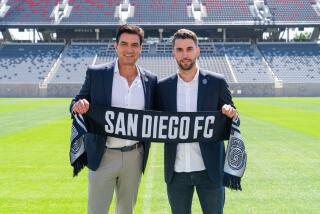NFL, to Play You Must Pay
- Share via
It’s one thing to go down in history as the mayor who lost professional football -- a fate San Diego Mayor Dick Murphy is scrambling to avoid as his city’s Chargers try to wriggle out of a stadium lease and, possibly, move to Los Angeles. It’s another thing to be the elected official who, in a rocky economy, dares to suggest that Los Angeles, Pasadena or Carson cut a big check to lure the National Football League back to town.
No doubt many fans would love to see the NFL scrimmaging again at a local stadium on Sundays, Thursdays and Monday nights -- or whenever the league sees fit to line up and knock heads. So would the NFL’s media partners, who drool at the idea of the league back in the nation’s No. 2 media market. But an eight-year absence has made it clear: Pro football needs Los Angeles more than the metropolis needs the league. Civic leaders should keep chanting that mantra as the NFL scouts a return to the world’s entertainment capital.
And if L.A. civic leaders need more spine, they can look to the bad example of San Diego, which is haunted by its ill-advised, poorly structured deal to keep the Chargers. San Diego agreed years ago to a stadium expansion deal that included a promise that taxpayers would buy unsold Charger tickets. Guaranteed sellouts, though, aren’t good enough for the team, which has been a cellar dweller in the standings. The team now wants the city to rubber-stamp an owner-friendly accord to produce a new stadium, surrounded by retail and commercial development; if the city refuses, that gives the franchise its freedom to leave San Diego.
In Los Angeles, rumors of the NFL’s return blow like Santa Ana winds, heating things up before dying away. One day it’s the Chargers, the next it’s the Indianapolis Colts, the New Orleans Saints or some other team that sees green turf in another city’s publicly financed stadium. In the NFL’s last push, Philip Anschutz, one of the world’s richest people, and Ed Roski Jr. unsuccessfully argued they needed $58 million in municipal bonds to make the financing for an NFL-worthy stadium pencil out.
But the NFL and any owners who want to be in Los Angeles must understand this: There’s no such public bonanza waiting in this end zone. Sure, it would be fun to see pro football in Los Angeles, but only if the league somehow manages to tap the deep pockets of Hollywood tycoons, media moguls or land barons, not weary taxpayers. Let a pro team pay its own way, then dub itself the Los Angeles (or Pasadena or Carson) Free Enterprise.
More to Read
Go beyond the scoreboard
Get the latest on L.A.'s teams in the daily Sports Report newsletter.
You may occasionally receive promotional content from the Los Angeles Times.










